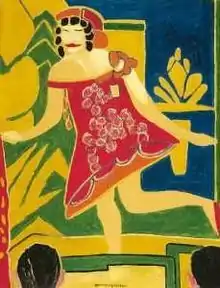Fauvism
Fauvism (French for The Wild Beasts) was the name of a modern art movement in the early 20th century, led by the painters Henri Matisse and André Derain. The Fauves were a group of French painters who were influenced by the bright colours used by the Post-Impressionists Vincent van Gogh and Paul Gauguin.[1]

Danceuse by Alexis Mérodack-Jeanneau, 1910
The bright colourful style of painting that they used began around 1900 and continued beyond 1910, but the group was only together for three years, 1905–1907. In that time they had three exhibitions together. Their influence has continued until the present day, and was adopted or influenced many artists who are not usually thought of as fauvists. Aristarkh Lentulov is one good example.
Gallery
 Danseuse jaune (yellow dancer) by Alexis Mérodack-Jeanneau, 1912
Danseuse jaune (yellow dancer) by Alexis Mérodack-Jeanneau, 1912 Fauve still life by Alfred Maurer, about 1908/1910
Fauve still life by Alfred Maurer, about 1908/1910 Fauve landscape by Alfred Maurer, around 1908
Fauve landscape by Alfred Maurer, around 1908 Influence of fauvism: a portrait of the Die Brücke group by Ernst Ludwig Kirchner, 1926/27
Influence of fauvism: a portrait of the Die Brücke group by Ernst Ludwig Kirchner, 1926/27_Landscape_(Paysage_Fauve)_-_Smithsonian_American_Art_Museum.jpg.webp)
References
- John Elderfield, The "Wild Beasts" Fauvism and its affinities, 1976, Museum of Modern Art, p13 ISBN 0-87070-638-1
Related pages
This article is issued from Wikipedia. The text is licensed under Creative Commons - Attribution - Sharealike. Additional terms may apply for the media files.